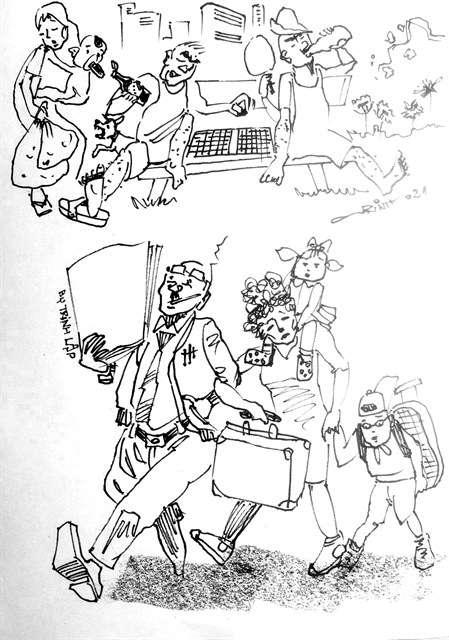
Illustration by Trịnh Lập
by Anh Đức
"Treat others as you would like others to treat you" is probably one of the most common teachings people come across. The great philosopher Confucius is widely known as among the first to preach this idea, and it can also be found in other religions and cultures across the world: in a verse of the Bible, the teachings of Buddha and Prophet Muhammad's Hadith. It is called "the Golden Rule".
As society and technology progress, it is confusing and sad that the Golden Rule is being ignored. People now tend to mistreat others, and do whatever they want without consent. And sadly, in most cases it is women who bear this mistreatment, offering little to no retaliation.
An expat TikToker in Việt Nam has become famous for his "crazy" videos. One of his latest videos was, however, polarizing. It shows a young girl sitting alone, happily eating noodle and sausage. The TikToker then shows up, scooches closer and closer to the girl, and gestures for her to put "something" in his mouth as if mock begging. He repeats this for almost a minute, with the girl looking at him angrily, clearly uncomfortable.
The comments in response were of two different worlds: some viewers denounced the TikToker for blatantly harassing the girl for internet fame; others viewed his stunt as "just a joke", saying "it's okay for westerners to do such things, their culture is more easy-going".
The young girl, Ánh Ngọc (not her real name), aged 23, said that what happened in the video did not show the bigger picture. She recalled that man was catcalling Vietnamese girls in front of the convenience store where she bought her food. After a while, he started to film his aforementioned "prank", without the consent of the girl, nor did he blur her face in the video. Ngọc demanded an apology but the prankster ignored her, and so she turned to social media to help report and remove the content.
"But after I publicly condemned him on Facebook, his wife started to harass me through private messages. The couple even hosted a livestream where my face was again used without my consent and ridiculed," Ngọc said. "All I wanted was just an apology, nothing more. I felt scared and ashamed."
But Ngọc's story is sadly just one of many, and not even the worst example of harassment and mistreatment of women. There are stories of women getting teased, or abused, either in public or private spaces, no matter what they are wearing or what they are doing. And some of those perpetrators are, you guessed it, pranksters doing it for their fifteen minutes of fame.
A prank or a joke by any definition should be funny and make people laugh for the right reasons, not cringe-worthy and make people feel bad. Even hidden camera prank shows like "Just For Laughs" ask subjects for their consent to use footage of their face. People who are annoyed, or scared by the pranks are apologized to immediately. No person should ever be the target of public humiliation.
And in what "easy-going, open" culture is such street harassment appropriate? If you harass people on the street, you can be fined up to 750 euros in France, or spend a month in jail in the Philippines. This is not to mention the public backlash you would almost certainly face if the act was recorded and posted on the internet. You would be ashamed, not the other way around.
Dear readers, how would you respond if what happened to Ngọc happened to your children? Would you want to see them suffer, not only the initial harassment but the ignorant responses of the public? Or would you fight for them and stand up against the bullies and such behaviour? Small “jokes and pranks", if encouraged and not met with a response, can turn into worse behaviour against women or underprivileged groups.
Equality, either for gender, race, or anything else, does not start with something big and ambitious. It starts with the proper respect that people should give to each other, regardless of who you are, or where you are from. It is only from these small deeds that we can truly try to understand each other more, and foster bigger conversations for grander causes. The Golden Rule needs to be followed and passed down among generations for it to be forever golden. —VNS
OVietnam